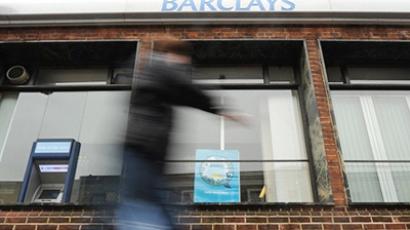VTB to lead privatization with 60% profit growth forecast

Fresh from the successful placement of a 10% stake to lead the government privatization program, Business RT spoke with Herbert Moos, Deputy President and Chairman of the Management board at VTB, who also tipped 60% profitability growth for 2011.
RT: Can you tell us why the placement of a stake in VTB was so significant?HM: “I think this is the first placement within the new privatization programme that the Russian Federation has announced.As you know, Russia will be privatizing approximately 400 enterprises in the course of the next 3 years.That’s a very significant effort.And the government has chosen what they believed one of their best assets, VTB, to kick off these privatizations. So we are very proud to be the first one.We are also very proud of the result that we have achieved.This privatization is also important in that, for the first time, it utilizes a new legislation.This legislation is a transparent legal framework, where the government hires a professional advisor – in this case the government has hired Bank of America Merrill Lynch as an advisor – for the seller.The advisor has hired underwriters for this deal, who have ultimately built the book – which were VTB Capital and Deutsche Bank – and thus it paves way for a new structure that could be replicated for future privatizations.”RT: How is this different from before?HM: “All privatizations were happening through an SPV, where the shares of the government were transferred to an SPV.This time the government directly sells the shares to the investors.So for investors it’s a much more transparent sale.As you’ve heard yesterday, Mr Putin, the Prime Minister has signed a decree over the weekend, that specifically authorized the price and the investor allocation.So, in that respect, it’s the most transparent structure, never been used in Russia before.It is also the structure that for the first time utilizes professional advisors – the agents, authorized investment banks – that choose the best methods of placing.In this case they have chosen the public placement.And they are also hiring all the consultants and ensure that the actual process of privatization; the delivery the structure, is corresponding to the best market circumstances and the best interests of the government.”RT: You think this will be the scheme they use for the rest of their privatizations?HM: “That’s right.The expectation is that the scheme that very much VTB Group, VTB Capital, we are developing with the government, will be replicated for future privatizations.And again, as I said, it is the most transparent scheme that has been used so far.And I many respects it is very much welcomed by the investors.”RT: What about the investor structure? HM: “I think that what we are also proud of is the book that we’ve built, the investors that came to this placement.Very importantly, VTB Group, obviously is a public company, and has been in the market for a number of years now.Last year, in May last year, the supervisory board of VTB has adopted a new strategy that is focused on maximizing the shareholder value, maximizing the return on equity.The management of the bank has conducted a number of investor meetings, a roadshow, at that time.In summer and autumn we visited the United States, New York, Boston, Europe, London, Continental Europe, Asia, we went to Hong Kong, Singapore, to showcase that strategy. Right now we were able to report the first results of that strategy, since we’ve almost had a year after we had the announcement, and investors could see that that strategy is bearing fruit.Of course, early results, nevertheless, it’s a very important milestone.That the bank has announced the strategy – it was a 3 year strategy – and it was able to demonstrate first results.That strengthened investors confidence in that the bank is on the right path, and we were able to attract the book that we attracted.If we talk about the book, the book was oversubscribed by two times, which in the current environment, in the environment where, frankly, the beginning of this year was not the most favourable for Russian issuers.As you know a number of equity issuances were either postponed or changed.It was still a challenging period for us.Nevertheless, as I’ve said, we have attracted very strong interest.Investors were specifically excited by the fact that we have a new strategy, by the fact that we have a very unique business model in Russia, and I think what also investors recognized was that we are the only universal Russian bank.So we are the only bank that combines a strong corporate bank, very profitable retail bank, and number 1 investment bank.So, in that respect, we are the only Russian bank that combines these platforms.And that obviously gave us significant synergies.Many investors were interested in our growth agenda – the organic growth as well as the inorganic growth – as you know we’ve announced the acquisition of two banks.The Transcredit bank that we are I the process of completing and the Bank of Moscow, that we intend to buy.So that was also a very interesting story, and many investors were very excited by this.So overall that led us to a very strong book of demand.”RT: At the same time the participants of the first IPO, they were quite disappointed with the share slump.How are the shares performing?HM: “Right now the shares perform very well.I am very pleased for our investors, I received a number of calls yesterday from the investors.The share price at the opening went sharply up.I think last night we were the leader on the Russian stock exchange, we closed one of the highest. And in London we closed approximately 3% up on the day which is a very good result.”RT: Some analysts are very skeptical, other say the shares potential is about 20%.Would you agree with that?HM: “Well based on our new strategy, it’s a 3 year strategy and it’s called ‘Road to 15’ and 15 refers to a share price that we should attain by the end of the year 2013.Right now we trade at just below 10, so if we want to get to 15 kopecks in three years time that tells you that we have 50% upside in the next 3 years.So we are looking forward to it.”RT: Are you considering one day during this privatization programme becoming a private bank in the longer term? HM: “I think the government is very interested in creating a stable financial system, a stable banking system.I think it was a great lesson for Russia to realize that, at the time of the crisis, they didn’t have enough stable players.The government supported all the banks, they supported VTB as well, but fundamentally the government doesn’t want to come back and support the banks every time there is a crisis.The government wants to see a stable and resilient banking system.For that reason I think that the government is very liberal and that it will be considering selling further stakes in the bank.Whilst they are not considering selling anything this year, overall the strategy is liberalize the banking system, and no doubt the government will be looking favourably to privatizing VTB, except of course there needs to be a consensus market environment, where investors are comfortable owning VTB stock.As you also mentioned VTB also has very big retail operations, and therefore it is important that the depositors have confidence in a bank’s strength. Right now they derive a lot of that confidence through the government ownership.We want to make sure that over the next three, five, ten years, we develop the bank in a way that proves to investors, that even without government support we can stand on our own two feet, and that’s the objective for the management.Certainly the government and the bank will be welcoming more and more foreign shareholders, more Russian shareholders, more private shareholders, in VTB.”RT: How do you think they can get rid of control?HM: “I think in the short term I don’t think the government will look to reduce their stake below controlling. In the longer term I think the government is a liberal government.In that respect they will be looking to create more privately held institutions.But, as I said, it is important that the confidence is there, so that the government will not do this at the expense of losing some confidence.Ultimately the government is still a 75% shareholder.They have realized very good returns from the investment in VTB.I think you’ve mentioned the IPO, the most recent involvement of the government, which was in September 2009, the government invested in VTB stock – at that time approximately $6 billion – and they invested at a share price in Russia of 4.8 kopecks.Right now we are trading at just over 9 kopecks – so they have already realized almost 100% return from that investment.So he government is behaving as a very commercial shareholder, and no doubt, now that they have a smaller stake – it’s still very significant, it’s 75% – no doubt they will be interested to see how that stake could be further maximized.”RT: Talking about the possible acquisition of the Bank of Moscow, how do you think the situation will develop? Recently government figures have called for an open tender. So how do you think the situation will develop and will you be participating in the tender if it takes place?HM: “I think the government of Moscow has announced the bank will be privatized, they have included it in the privatization list, VTB has an intention of buying this bank, we believe that we will acquire the Bank of Moscow in the first half of this year.”RT: Do you plan any other acquisitions, apart from Transcredit bank and Bank of Moscow? Here in Russia or abroad, I mean? HM: “I think not at this stage. I think that we certainly want to make sure that we deliver on those two acquisitions that we intend.One interesting fact that in the last 5 years, VTB bank bought 10 banks – 2 in Russia and 8 abroad – and we have been able to successfully integrate those.That said, we recognize that the integration of a bank, especially large banks like Transcredit bank and Bank of Moscow, will require a lot of effort on the part of the management team.We do have an existing integration team that will be now moving to those two banks. But it will still require a significant amount of management effort.So for that reason we want to be responsible. So at this stage we don’t want to overstretch ourselves.At the same time, as you know, the Russian banking industry still has approximately 1000 banks, so the consolidation of the industry is inevitable.We are already playing a part in that – consolidating those two banks.But there will be other targets.Our primary acquisition criteria is that the bank, or the target that we are buying, has to be ROE accretive, for the bank.We need to make sure that it fits within our new strategy, Road to 15, it adds to our corporate business or retail business or investment banking business, and thirdly we want to make sure that we can sustain and integrate the team that we are buying, the product that we are buying, and retain the clients that we are buying.As long as the target meets those objectives we will be looking at other acquisitions that become available.”RT: Earlier you said that you have enough capital for those two acquisitions, so are you planning any borrowings this year?HM: “We don’t plan to raise any further equity as you said.We do believe that we have sufficient amount of capital to acquire those two banks.Furthermore we are very profitable, we expect for year 2010, the year we are just closing right now, to earn over 50 billion roubles – that will be the record amount of earnings that VTB has ever posted.This year, in 2011, we forecast to earn 80 billion roubles, so that’s a 60% growth in profitability. So these are very ambitious targets, and as a result our capital base will continue to grow very substantially, and that will give us room for further acquisitions.”RT: So now borrowings this year?HM: “No, no capital borrowings.Of course in our daily activities we expect to borrow as we normally do to finance our operations.”RT: How much?HM: “We expect to borrow a similar amount to what we borrowed last year.I think last year we borrowed approximately $5 billion in wholesale markets.Roughly half of that was in Russia, in Russian domestic markets, the rest was in foreign markets.And we will pursue a similar strategy, that we pursued last year, in terms of diversification of the foreign borrowings.I will remind you that we became the first Russian issuer in Singapore, very successful deal – we started with a hundred million Singapore dollars, we closed with 400 million, very strong demand.We became the first issuer in China, first Russian issuer in China, we issued one billion Renminbi in China.This year we will be looking at Brazil and a few other interesting exciting markets.We will let you know once we get there.”RT: And for what are these borrowings?HM: “These are for normal activity, for corporate and retail lending activity.”RT: And taking into account your record high net profit last year, are you planning to raise bonuses to top managers?HM: “The way we manage our bonuses is that they are dependent upon the results of the operations. So we will only pay bonuses to the divisions that earn those bonuses.There is a direct link between the profit that was post and the level of compensation.So, in that respect, those divisions that performed well, they will receive bonuses, those divisions that underperformed will not.In that respect we don’t expect a significant increase, we expect a normal market level compensation for our managers this year.”RT: Can you announce any figure?HM: “Not at this stage, we still haven’t finalized our 2010 results, so it would be premature to nominate a figure right now.”RT: Are you planning to get rid of any non core assets? HM: “Frankly we don’t really have non core assets.We acquire operations.We acquire certain collateral, as part of non performing loans, and the objective here is to obviously still realize the loan.So we still want to make sure we can return the loan – the loan’s interest and principal.Every time we approach this it will be an individual decision.Either we dispose of that asset or sometimes with real estate development we develop that real estate development, but ultimately the objective is obviously to close and exit those investments.We develop a plan for each of our so called non core assets, and they are part of our business. They are part of our core business – we know when the loans get repaid, we know when the interest comes back to the bank and the principal gets repaid.Here I think we are past the peak of acquiring those non core assets, and we just have a normal, business as usual operation, where we manage those assets with a view to return those loans.”RT: What about bad debts? Is the percentage of them growing?HM: “I think it’s falling, we are certainly past the peak by now, and we have seen a steady fall in the past three quarters of 2010.For this year we expect that further to fall, and we expect for the new loan portfolio, our cost of risk, or percentage of reserves that we create against the bad loans, will be somewhere between 1 and a half and 2%.So a fairly low number.We think that’s a new normal post crisis, to realize approximately 1 and a half, 2% of the bad loans, the credit portfolio.”RT: And your credit portfolio, do you expect it to grow in 2010 and 2011?HM: “In 2010, we are closing the year as I said, we expect it to grow above market. Our current expectation will grow somewhere in the area of 12 to 14% – hopefully the higher end – so just under 15% is what we communicate to our investors.For this year – 2011 – we have fairly high growth expectations. We think our corporate book will in line with market, and we think that will be approximately 15%. Our retail book will grow above the market, and we expect, here, growth above 20%.”













